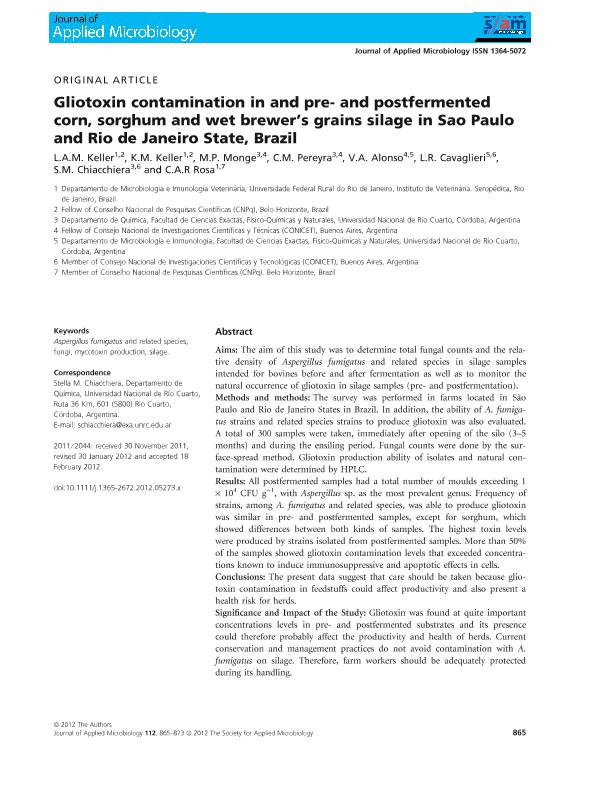Mostrar el registro sencillo del ítem
dc.contributor.author
Keller, Luiz Antonio Moura

dc.contributor.author
Keller, Kelly Moura

dc.contributor.author
Monge, Maria del Pilar

dc.contributor.author
Pereyra, Carina Maricel

dc.contributor.author
Alonso, Veronica Andrea

dc.contributor.author
Cavaglieri, Lilia Reneé

dc.contributor.author
Chiacchiera, Stella Maris

dc.contributor.author
R Rosa, C. A.
dc.date.available
2023-03-02T17:21:16Z
dc.date.issued
2012-05
dc.identifier.citation
Keller, Luiz Antonio Moura; Keller, Kelly Moura; Monge, Maria del Pilar; Pereyra, Carina Maricel; Alonso, Veronica Andrea; et al.; Gliotoxin contamination in and pre- and postfermented corn, sorghum and wet brewer's grains silage in Sao Paulo and Rio de Janeiro State, Brazil; Wiley Blackwell Publishing, Inc; Journal of Applied Microbiology; 5-2012; 865-873
dc.identifier.issn
1364-5072
dc.identifier.uri
http://hdl.handle.net/11336/189424
dc.description.abstract
The aim of this study was to determine total fungal counts and the relative density of Aspergillus fumigatus and related species in silage samples intended for bovines before and after fermentation as well as to monitor the natural occurrence of gliotoxin in silage samples (pre- and postfermentation). Methods and methods: The survey was performed in farms located in São Paulo and Rio de Janeiro States in Brazil. In addition, the ability of A. fumigatus strains and related species strains to produce gliotoxin was also evaluated. A total of 300 samples were taken, immediately after opening of the silo (3-5 months) and during the ensiling period. Fungal counts were done by the surface-spread method. Gliotoxin production ability of isolates and natural contamination were determined by HPLC. Results: All postfermented samples had a total number of moulds exceeding 1 × 10 4 CFU g -1, with Aspergillus sp. as the most prevalent genus. Frequency of strains, among A. fumigatus and related species, was able to produce gliotoxin was similar in pre- and postfermented samples, except for sorghum, which showed differences between both kinds of samples. The highest toxin levels were produced by strains isolated from postfermented samples. More than 50% of the samples showed gliotoxin contamination levels that exceeded concentrations known to induce immunosuppressive and apoptotic effects in cells. Conclusions: The present data suggest that care should be taken because gliotoxin contamination in feedstuffs could affect productivity and also present a health risk for herds. Significance and Impact of the Study: Gliotoxin was found at quite important concentrations levels in pre- and postfermented substrates and its presence could therefore probably affect the productivity and health of herds. Current conservation and management practices do not avoid contamination with A. fumigatus on silage. Therefore, farm workers should be adequately protected during its handling. © 2012 The Authors. Journal of Applied Microbiology © 2012 The Society for Applied Microbiology.
dc.format
application/pdf
dc.language.iso
eng
dc.publisher
Wiley Blackwell Publishing, Inc

dc.rights
info:eu-repo/semantics/openAccess
dc.rights.uri
https://creativecommons.org/licenses/by-nc-sa/2.5/ar/
dc.subject
ASPERGILLUS FUMIGATUS AND RELATED SPECIES
dc.subject
FUNGI
dc.subject
MYCOTOXIN PRODUCTION
dc.subject
SILAGE
dc.subject.classification
Micología

dc.subject.classification
Ciencias Biológicas

dc.subject.classification
CIENCIAS NATURALES Y EXACTAS

dc.title
Gliotoxin contamination in and pre- and postfermented corn, sorghum and wet brewer's grains silage in Sao Paulo and Rio de Janeiro State, Brazil
dc.type
info:eu-repo/semantics/article
dc.type
info:ar-repo/semantics/artículo
dc.type
info:eu-repo/semantics/publishedVersion
dc.date.updated
2023-02-27T17:44:49Z
dc.identifier.eissn
1365-2672
dc.journal.pagination
865-873
dc.journal.pais
Reino Unido

dc.journal.ciudad
Londres
dc.description.fil
Fil: Keller, Luiz Antonio Moura. Universidade Federal Rural do Rio de Janeiro; Brasil
dc.description.fil
Fil: Keller, Kelly Moura. Universidade Federal Rural do Rio de Janeiro; Brasil
dc.description.fil
Fil: Monge, Maria del Pilar. Universidad Nacional de Río Cuarto. Facultad de Ciencias Exactas Fisicoquímicas y Naturales. Instituto de Investigación en Micología y Micotoxicología. - Consejo Nacional de Investigaciones Científicas y Técnicas. Centro Científico Tecnológico Conicet - Córdoba. Instituto de Investigación en Micología y Micotoxicología; Argentina
dc.description.fil
Fil: Pereyra, Carina Maricel. Universidad Nacional de Río Cuarto. Facultad de Ciencias Exactas, Fisicoquímicas y Naturales. Departamento de Microbiología e Inmunología; Argentina. Consejo Nacional de Investigaciones Científicas y Técnicas; Argentina
dc.description.fil
Fil: Alonso, Veronica Andrea. Consejo Nacional de Investigaciones Científicas y Técnicas; Argentina. Universidad Nacional de Río Cuarto. Facultad de Ciencias Exactas, Fisicoquímicas y Naturales. Departamento de Microbiología e Inmunología; Argentina
dc.description.fil
Fil: Cavaglieri, Lilia Reneé. Universidad Nacional de Río Cuarto. Facultad de Ciencias Exactas, Fisicoquímicas y Naturales. Departamento de Microbiología e Inmunología; Argentina. Consejo Nacional de Investigaciones Científicas y Técnicas; Argentina
dc.description.fil
Fil: Chiacchiera, Stella Maris. Universidad Nacional de Río Cuarto. Facultad de Ciencias Exactas Fisicoquímicas y Naturales. Instituto de Investigación en Micología y Micotoxicología. - Consejo Nacional de Investigaciones Científicas y Técnicas. Centro Científico Tecnológico Conicet - Córdoba. Instituto de Investigación en Micología y Micotoxicología; Argentina
dc.description.fil
Fil: R Rosa, C. A.. Universidade Federal Rural do Rio de Janeiro; Brasil
dc.journal.title
Journal of Applied Microbiology

dc.relation.alternativeid
info:eu-repo/semantics/altIdentifier/doi/http://dx.doi.org/10.1111/j.1365-2672.2012.05273.x
dc.relation.alternativeid
info:eu-repo/semantics/altIdentifier/url/https://academic.oup.com/jambio/article/112/5/865/6716064
Archivos asociados
